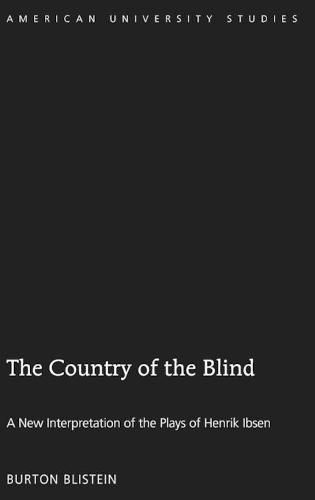Readings Newsletter
Become a Readings Member to make your shopping experience even easier.
Sign in or sign up for free!
You’re not far away from qualifying for FREE standard shipping within Australia
You’ve qualified for FREE standard shipping within Australia
The cart is loading…






This title is printed to order. This book may have been self-published. If so, we cannot guarantee the quality of the content. In the main most books will have gone through the editing process however some may not. We therefore suggest that you be aware of this before ordering this book. If in doubt check either the author or publisher’s details as we are unable to accept any returns unless they are faulty. Please contact us if you have any questions.
The Country of the Blind challenges the reigning conception of Ibsen as social critic. It offers new and unique interpretations stressing his preoccupation with the limitations and failings of humankind that do not change, in particular one’s reluctance or inability to confront unpleasant truths about one’s self and the consequent attempts to conceal those truths from self and from others. The result, in the plays considered, is that his personae are not what they appear to be. We shall observe that Mrs. Alving is not an heroic figure who has sacrificed all for her beloved son; that the virtuous parson Manders may in fact be the father of Oswald; that neither Gregers Werle nor Dr. Thomas Stockmann are the idealists they profess to be; that Hedda Gabler and Halvard Solness are the very antitheses of the persons they imagine themselves. This gulf between illusion and actuality is evident even in the case of secondary agents, confirming the supposition that Ibsen believed self-deception inseparable from the human condition. The protagonists’ stratagems necessarily interact, forbidding each knowledge of each and all knowledge of the meaning of external circumstance. They are, and they remain, ignorant of their own nature, and of the character of their closest associates, imprisoned by the maze they have jointly fashioned. The book should be of interest to the general reader, to companies interested in performing the plays analyzed, to Ibsen scholars, and as a text for courses in Ibsen.
$9.00 standard shipping within Australia
FREE standard shipping within Australia for orders over $100.00
Express & International shipping calculated at checkout
This title is printed to order. This book may have been self-published. If so, we cannot guarantee the quality of the content. In the main most books will have gone through the editing process however some may not. We therefore suggest that you be aware of this before ordering this book. If in doubt check either the author or publisher’s details as we are unable to accept any returns unless they are faulty. Please contact us if you have any questions.
The Country of the Blind challenges the reigning conception of Ibsen as social critic. It offers new and unique interpretations stressing his preoccupation with the limitations and failings of humankind that do not change, in particular one’s reluctance or inability to confront unpleasant truths about one’s self and the consequent attempts to conceal those truths from self and from others. The result, in the plays considered, is that his personae are not what they appear to be. We shall observe that Mrs. Alving is not an heroic figure who has sacrificed all for her beloved son; that the virtuous parson Manders may in fact be the father of Oswald; that neither Gregers Werle nor Dr. Thomas Stockmann are the idealists they profess to be; that Hedda Gabler and Halvard Solness are the very antitheses of the persons they imagine themselves. This gulf between illusion and actuality is evident even in the case of secondary agents, confirming the supposition that Ibsen believed self-deception inseparable from the human condition. The protagonists’ stratagems necessarily interact, forbidding each knowledge of each and all knowledge of the meaning of external circumstance. They are, and they remain, ignorant of their own nature, and of the character of their closest associates, imprisoned by the maze they have jointly fashioned. The book should be of interest to the general reader, to companies interested in performing the plays analyzed, to Ibsen scholars, and as a text for courses in Ibsen.